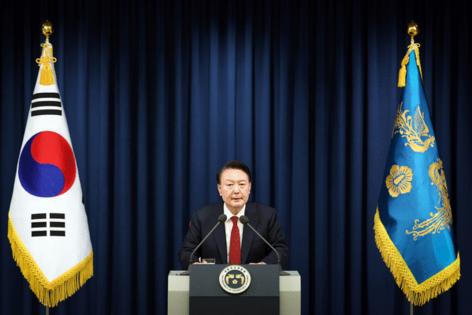South Korea's Yoon survives impeachment after martial law fiasco
Published in News & Features
South Korean President Yoon Suk Yeol survived impeachment on Saturday as his ruling party refused to join an opposition bid to oust him after he shocked the nation and its allies by briefly declaring martial law.
The impeachment vote failed to gain the 200-vote hurdle needed to suspend the president from duties, after the ruling party boycotted the vote. A lengthy standoff followed as the opposition waited for ruling party members to change their minds and vote. Despite some of them doing so it eventually became clear the motion wouldn’t pass.
The opposition, which controls a majority in the legislative body, has said it will push quickly for another vote.
The attempt to oust the president came after Yoon, 63, shook markets and surprised world leaders by declaring martial law for the first time since South Korea became a democracy nearly four decades ago. He rescinded the order six hours later after lawmakers raced to the National Assembly and voted down the decree.
While the outcome leaves Yoon in office for now, the ruling People Power Party will need to quickly find ways to shore up the administration and stabilize the situation to avoid the kind of escalating public protests seen in South Korea in the past.
PPP leader Han Dong-hun vowed to seek the president’s orderly exit to minimize the turmoil, telling reporters that Yoon will be effectively suspended from duties until he steps down. Prime Minister Han Duck-soo will take the lead role in running state affairs through close consultations with the ruling party, while communicating with opposition parties, the party leader said.
Under the country’s constitution, the prime minister’s role is to assist the president and direct the ministries following orders from the president.
Minutes after the failure of the vote, opposition Democratic Party leader Lee Jae-myung accused the ruling party of betraying the public. He apologized for failing to pass the motion, as other opposition lawmakers stood by him holding banners that read, “Impeach Yoon Suk Yeol.”
“We will ultimately impeach Yoon Suk Yeol,” Lee said. “We will return the state back to normal for you as a Christmas gift.”
The ruling party’s decision to boycott the vote came hours after Yoon apologized for plunging the country into a political crisis, saying he would leave it up to the ruling party to decide his fate.
The opposition bloc needed only eight votes from the ruling PPP to impeach Yoon. But Yoon’s conservatives refused to vote in favor of the motion, a move that would’ve likely handed their political opponents a big win in an early election that would have followed if he was removed.
The impeachment bid looked set to fail much earlier Saturday evening when members of the ruling party left the National Assembly without voting. But before casting their ballots, opposition members together called on each member of the PPP by name to return to vote.
“This incident will be written in our history, one that’s been built by the blood and sweat of our people,” parliamentary speaker Woo Won-shik said, as he urged ruling party lawmakers to return to the chamber and vote. “The head of a conservative group cannot speak alone for individuals’ consciences and values.”
In an unexpected twist, two of them did, adding to the one PPP member who already voted. That emboldened the opposition to leave proceedings at a standstill with several hours remaining before the 72-hour limit for the voting period was due to expire.
The votes by the three PPP members had prompted protesters outside the National Assembly to chant “five more to go.” As of 7 p.m., police estimated at least 100,000 people were gathered near the parliament to demand Yoon’s impeachment, compared with 18,000 Yoon supporters gathered near Gwanghwamun as of 6 p.m., according to Yonhap News.
But the chances of the impeachment failing strengthened when one of the ruling party members who cast a ballot said he voted against it.
The crowds started to thin as the likely result became clearer, the temperature dropped and food stalls started packing up having sold out of refreshments.
“I had planned to take rest this weekend but I felt so scared after martial law,” said Park Hye-rim, a 33-year-old office worker from northern Seoul. “Even if impeachment is voted down, I will come back to rally again and again. I will not give up.”
The political uncertainty in South Korea appears likely to persist, according to Jun Rong Yeap, a market strategist at IG Asia Pte. “Growing public outcries and intensifying pressure from the opposition party could potentially increase the risk of defections among PPP members,” he said, adding that the sustained uncertainty could remain a drag on its equities market into the new week.
———
(With assistance from Sohee Kim, Sangim Han, Sangmi Cha, Jaehyun Eom, Seyoon Kim, Hooyeon Kim, Shinhye Kang, Heejin Kim, Whanwoong Choi, Youkyung Lee, Eunkyung Seo and Min Jeong Lee.)
_____
©2024 Bloomberg News. Visit at bloomberg.com. Distributed by Tribune Content Agency, LLC.







Comments